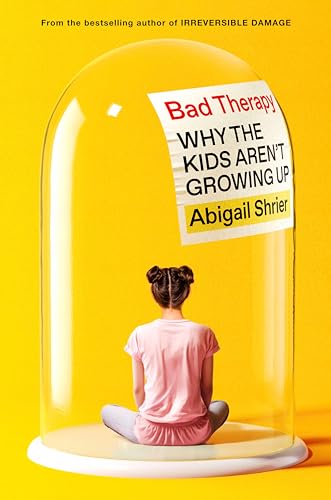
Bad Therapy: Why the Kids Aren't Growing Up
Abigail Shrier
About the Author

Abigail Shrier
Questions & Answers
The over-reliance on therapy and mental health interventions has contributed to the rise in mental health issues among young people by reinforcing negative self-perceptions and dependency. Therapy can inadvertently worsen conditions by encouraging rumination, reinforcing fears, and leading to dependency on therapists. This approach often labels normal emotions as disorders, leading to a sense of helplessness and diminished self-efficacy. Potential negative consequences include increased anxiety and depression, reduced resilience, and a culture of victimhood, where young people may believe they are inherently flawed and unable to improve their circumstances without external intervention.
Societal factors significantly contribute to the current mental health crisis among young people. The normalization of mental health issues, where conditions like anxiety and depression are widely accepted, leads to overdiagnosis and overmedication. This normalization also fosters a culture where individuals view themselves as inherently flawed, rather than resilient. The overuse of empathy, while well-intentioned, can lead to narcissism and a lack of accountability. Trauma-informed care, when misapplied, can encourage rumination and self-pity, rather than fostering resilience. These factors collectively create an environment where young people are more likely to seek diagnoses and treatments, often without addressing the root causes of their struggles.
The book challenges the prevalent narrative that childhood trauma significantly impacts adult life, leading to mental health issues and dysfunction. It argues that the concept of "trauma-informed care" has been overused and misapplied, leading to a culture of victimhood and diminished expectations for children. The book criticizes the idea that all unhappiness in adults can be traced back to childhood trauma, suggesting that this narrative absolves individuals of responsibility for their own actions and choices.
Instead, the book proposes alternative perspectives that emphasize resilience, the importance of family and community support, and the role of personal agency in overcoming adversity. It suggests that children should be treated as capable and resilient, with high expectations for their abilities and potential. The book also advocates for a more balanced approach to parenting and education, one that allows children to develop independence, problem-solving skills, and a sense of continuity with their family and history.
The "gentle parenting" approach emphasizes empathy, communication, and non-punitive discipline. Benefits include fostering emotional intelligence and building strong parent-child relationships. Drawbacks include potential for children to lack self-control and struggle with independence. The book argues for a balanced approach, suggesting that gentle parenting should be complemented with clear boundaries, consistent discipline, and high expectations. It criticizes the overuse of therapy and the normalization of mental health issues, advocating for more independence and resilience in children. The book emphasizes the importance of teaching children to cope with challenges and develop self-reliance, rather than constantly seeking therapeutic interventions.
The book suggests that the current mental health crisis among young people is not due to an increase in mental illness but rather to overdiagnosis and inappropriate treatments. It proposes several solutions:
- Limiting Therapy: The book argues for a more selective approach to therapy, emphasizing that not all emotional issues require professional intervention.
- Reducing Smartphone Use: It advocates for limiting smartphone use, especially among teenagers, to mitigate social media's negative impact.
- Encouraging Independence: The book encourages fostering independence in children, allowing them to face challenges and learn from failures.
- Reevaluating Trauma Theory: It criticizes the overemphasis on trauma and suggests that resilience is the norm, not the exception.
- Parental Involvement: It emphasizes the importance of parents' involvement in their children's lives, including setting boundaries and providing guidance.
The book advocates for a shift in societal attitudes and practices, including:
- Critical Evaluation of Mental Health Interventions: Encouraging a more critical approach to mental health treatments and therapies.
- Empowering Parents: Giving parents the confidence to make decisions about their children's mental health without over-reliance on experts.
- Promoting Resilience: Encouraging a culture that values resilience and personal growth over constant diagnosis and treatment.